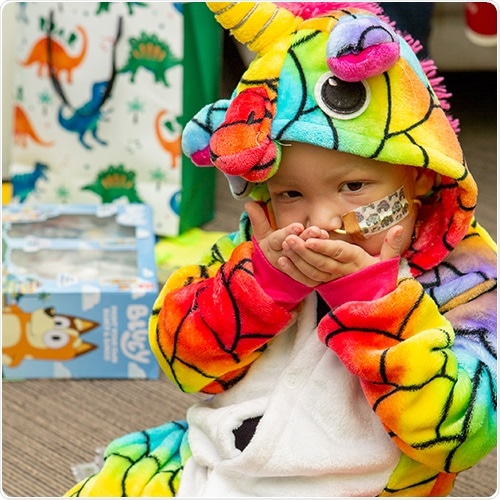It's a diagnosis you never want to hear: Acute Myeloid Leukemia (AML). These three words represent a devastating diagnosis of childhood cancer with dire consequences for many families.

Little Charlie, who died of AML at just age three. Image Credit: University of South Australia
In Australia, AML is the most common form of acute leukemia in adults and is responsible for one-fifth of all childhood leukemia cases (about 50 children) each year.
Now cancer experts at the University of South Australia are striving to change these outcomes as new genetic research shows that up to 19 percent of childhood AML cases are linked to rare genetic changes that may be inherited through family bloodlines.
These genetic aberrations can indicate a higher predisposition for AML and a potential sensitivity to chemotherapy treatments, so identifying these enables clinicians to better target treatments in children with AML.
Lead researcher, Professor Richard D'Andrea at UniSA's Acute Leukemia Laboratory says the discovery is an important step forward in the journey to a lasting cure for childhood AML.
AML is an acute cancer of the blood and bone marrow that spreads very rapidly and is difficult to cure.
Swift, precise treatment is critical for survival, yet AML is a complex disease with many subtypes and it is difficult to treat young children who have a highly aggressive AML.
These children often need a blood stem cell transplant – typically donated by a family member – so it's absolutely vital that we know whether there's an elevated familial risk of AML, or if the child has any genetic conditions that will make them hyper-sensitive to the chemotherapy used in the transplant procedure.
The sophisticated genetic technologies now available allow us to foresee some of these challenges, but there are still many more hurdles to come if we are to beat this devastating and complex cancer."
Professor Richard D'Andrea, Lead Researcher, UniSA's Acute Leukemia Laboratory
For the past five years, Prof D'Andrea and the team at the Centre for Cancer Biology have been working with pediatric oncologist, Dr Andy Moore from the University of Queensland to analyze DNA mutations and better understand the causes of childhood AML. They are also investigating new approaches to enhance the targeting and killing of AML cells.
Tomorrow, both Prof D'Andrea and Dr Moore will be sharing what they know about AML in children in a Facebook live Q&A session at 2.30 pm (Adelaide time) on Tuesday 22 March.
Hosted by parent Kelly Stephens, who experienced the tragedy of AML when her son Charlie died of the disease at age three (just 18 months after diagnosis), the session will provide a rare opportunity to speak with AML experts in an open forum, providing much-needed clarity and transparency of the deadly condition.
To register and attend this session, visit: www.facebook.com/events/934048947285724
To learn more about Kelly and Charlie's journey, and to support ongoing AML research please visit UniSA initiative Charlie's Rainbow at https://chuffed.org/project/charliesrainbow
Source:
Journal reference:
Samaraweera, S.E., et al. (2021) Childhood acute myeloid leukemia shows a high level of germline predisposition. Blood. doi.org/10.1182/blood.2021012666.